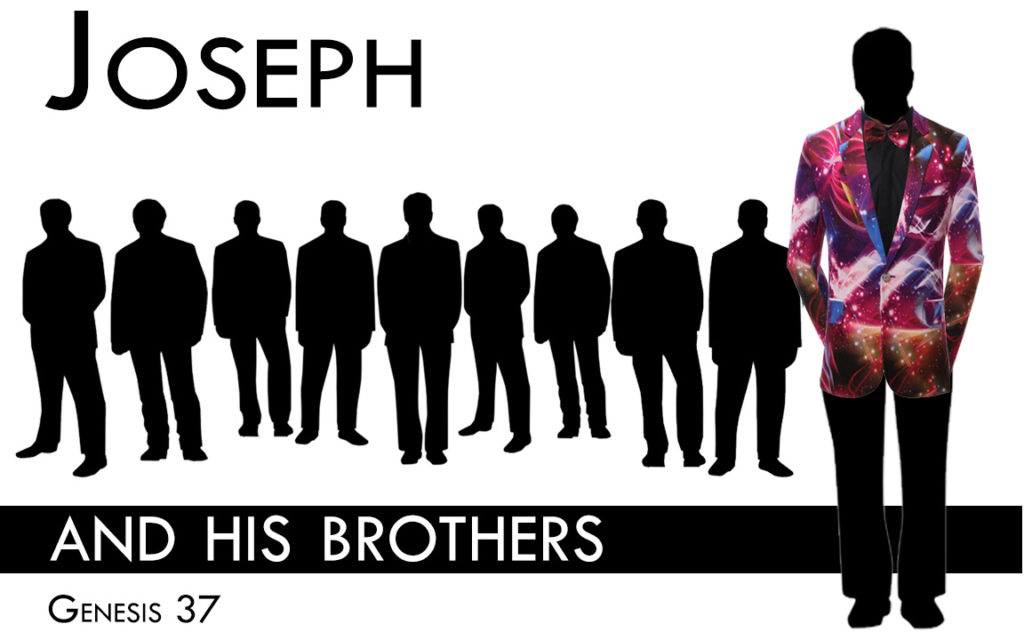Squad Rules
Read more...
JEHOVAH-WHO?
So go ahead. Name Him. To me He’s Jehovah-Orders my Steps.
Read more...

Joseph’s & His Brothers

As long as I’ve ever read the story of Joseph I’ve been able to see myself either real or aspirational as Joseph. Joseph is the underdog who has to endure harsh treatment by his brothers. He continues to succeed in spite of his many setbacks. He’s committed to personal purity in his denying the Potiphar’s wife. He uses his God-given gifts of interpreting dreams to achieve success. He is eventually recognized for his giftedness and promoted. Then to top it all off he is poster-child for mercy and forgiveness as he shows unconditional love for his brothers who wronged him in the first place.
Who doesn’t love the story of Joseph?
But what if we don’t look at the story from the viewpoint of Joseph? What if rather than see ourselves as the symbol of virtue in Joseph, we see ourselves as the villians of the story in the brothers.
No one wants to be the brothers. They are the villains of the story. That would be like watching Star Wars and cheering for the Empire. But I would argue that we are more like the brothers, especially given our current cultural climate, than we are like innocent little Joseph.
I think that the brothers model for us what happens when we take part in conflict within the confines of a group. In other words, how we are more likely to have certain attitudes or take certain actions while in the context of a group that we might not necessarily take on as individuals. Now this is not necessarily a bad thing. People may be more likely to protest peacefully when among a group of others committed to do the same. However, the same may be said for those who engage in violent protests or riots. The point is that we are more likely to exhibit certain behaviors in groups then when we are acting alone as individuals.
But what I find most interesting is that we appear to be more impressionable when we subscribe to one group or another. It seems easier to be influenced to think or act a certain way as long as it appears as though the rest of the group is thinking or acting a certain way. I remember as a youth when asked if I wanted to go somewhere or do something the first thought in my mind was, “who else is going to be there.” If enough of the group was taking part in that activity then I would be more likely to go even if the activity itself didn’t appeal to me personally.
I really didn’t like playing football much as a child but it was the most important sport to my group and so I suited up and endured “bull in the ring”. I still have nightmares about that drill but that’s a subject for another blog.
So what happened to this group of brothers that they conspire to throw their little brother into a pit and later sell him into slavery while telling their father that he was mauled and eaten by wild animals?
I would contend that the brothers had been conditioned to hate Joseph’s mother, Rachel. Rachel was the despised one simply because she was the favorite of their father, Jacob. Most of Jacob’s children were born to his first wife and Rachel’s sister, Leah. If you read the story you’ll learn that it was never even Joseph’s intention to marry Leah in the first place and was tricked into doing so in order to eventually have Rachel’s hand in marriage. Leah hated that she was always had to play second fiddle to Rachel. I know, this sounds really weird.
It stands to reason that the brothers picked up on this animosity towards Rachel and took on that attitude themselves. Rachel and thus Joseph were taught to be their enemy.
The Dallas Cowboys are my enemy. They’ve done nothing to me personally but my father and mother are fans of the Washington football team (yes, I’m one of “those people” who thinks the name should be changed but that, again, is another blog. Judge me at your leisure. I’ll be ok). I learned to love the Washington football team. And if you love the Washington football team then you by extension you have to hate the Dallas Cowboys. There was a shirt that I remember seeing a lot as a kid that said, “I’m a fan of the Washington Redskins and whoever is playing the Cowboys!” (I know but I had to use the name in a direct quote. Again, judge away).
Don’t we all tend to learn love and hate from those who we respect and admire? So if my mother, Leah, hates Rachel, shouldn’t I then hate Rachel as well? And then by extension, shouldn’t I hate Joseph as well? Joseph likely never stood a chance. Based solely on his association with Rachel, Joseph was a pariah.
We do this all of the time. Because someone is associated with a particular group or person, we associate that that person our feelings that we already have towards that group or person. If I find that you are a Democrat or Conservative, I attribute to you all of the negative feelings that I have towards that group. If you are an from a particular country or state then I attribute to you all of the negative feelings that I have towards that country or state. If you are of a particular race I attribute to you all of the negative feelings that I have towards that race.
This leaves all of us vulnerable to propaganda because now I don’t have to be influenced to hate a particular person or group. All I have know is that my group has negative feelings or attitudes towards a particular person or group.
So what do we do with this information? We remain watchful and sober-minded when consuming information that we don’t jump to conclusions about others who may appear to be at odds with the groups we ascribe to. That’s the least that we’ll need to do in order to be able to effectively love our neighbors.
Read more...

Remarkable Faith

Peter walked on water. But he sank so big deal right? Well, he did get out of the boat so that’s got to be worth something right. But he sank so whatever. But at least he tried, didn’t he? But he sank so let’s move on.
I’ve recently been preaching in church from some of my favorite stories in the bible. These are some of the stories that we’ve learned in Sunday School since we were old enough to walk. As a result, I tend to shy away from these stories because I’ve preached them before. In addition, there’s a good chance the people I’m ministering to have heard them before and we’re always supposed to have something new and original to share right? Wrong. So I’ve been taking a fresh look at some of these stories that I have overlooked.
Who isn’t familiar with the story of Peter walking on the water? No hands? For the purpose of this blog I’m not going to retell the whole story in great detail. Suffice it to say that Jesus came to the disciple walking on the water. Peter asks if he can come out of the boat and also walk on the water to which Jesus says, “yes”. Peter actually begins walking on the water but when he sees that he’s surrounded by a storm he begins to panic and starts to sink. He cries out to Jesus who comes to his rescue and then asks Peter why he doubted which was apparently the cause of his failure. Poor Peter.
Here’s are a few reasons why I think that Peter is a pretty remarkable disciple. First of all, he asked God for something insane! Who thinks about doing something so miraculous just because Jesus is able to do it? The utter imagination that it takes to think of such a request is nothing short of remarkable. Remember, they were in the midst of a storm and had it been me I would have asked Jesus to stop the storm. I would prayed for safety rather than asking Jesus to enable me to do something that puts my life in greater jeopardy! But this is just the kind of prophetic imagination that we all ought to have. We serve a creative God and yet we tend to only ask Him to do what He’s already done. If He can truly do more than we can every ask or think then we’ve got to ask or think better. Because remember, none of the other disciples asked and none of the other disciples got to walk on water even if only for a moment.
Secondly, Peter actually got out of the boat. He called God’s bluff and proceeded, at God’s allowance, to do something that hadn’t been done by anyone else. Can you just imagine the willpower it had to take for him to something that with every step his mind was telling him that this was impossible and yet he would find himself standing on a firm foundation. However, that fear would have to be overcome each time he placed all of his weight on the the front foot to take another step on a this moving water and yet still finding the a solid foundation to land upon. It had to be a stressful exercise in faith. Each step required greater faith than the former. The faith required to get out the boat was one thing but every moment of this experience challenged Peter’s belief in everything he believed was true and to continue to believe God’s word over rational thought.
Finally, he begins to sink. When he saw the storm it became too much for his mind to overcome. Walking on water in the middle of the night in the midst of a storm. But we should give some credit because at least he gave it a shot right? Right. We should cut him a break but not just for his getting out of the boat but for what he did when he began to sink. He cried out to Jesus! Now at first glance we may think that calling out to Jesus was his only option but remember, he also had the disciples and the boat that he could have turned to. But he understood that it was better to be with Jesus, even on the water in the midst of a storm, then within the safety of a boat.
Choose Jesus. Always. Above all other options always choose Jesus.
Read more...

Misplaced Faith

In the gospel of John chapter 5 we find a man who is unable to walk due a disability waiting for an opportunity to be healed. In order to receive this miracle it would be important for a couple of things to happen almost simultaneously. First, the story says that an angel comes down to “stir” or agitate the water. Secondly, the person needing to be healed would have to be the first to get into the pool. For the man in our story, this would have meant that he would have to have gotten help from someone else to get into that water.
That seems to me to be an incredible sequence of events that have to take place for this man especially in the presence of others, some of whom must have been presumably less disabled, who were in competition for this miracle!
Jesus comes upon him and asks, “Do you want to be healed?” While the answer to this question should have been a resounding “YES!”, it wasn’t. In fact, the man never answers Jesus question at all but rather points to major obstacle to his deliverance. He tells Jesus, “I’ve got nobody to help me into the water.”
The problem with his response points to what I call “Misplaced Faith” and I say this for 2 reasons.
First of all this man had placed his faith in other people rather than God. He concluded that unless someone helped him, he couldn’t get beyond his place of bondage. This is an obstacle that many of us allow to hinder us from moving forward. Because we may feel as though we’ve been dealt a bad hand by our families, our employers or even the government systems, we conclude that we cannot move beyond our own places of bondage. And while it is true that we all could use some help from time to time, the best help you can ever get comes from God.
King David who had the support and assistance of his own army and his subjects says in Psalms 121, “Where does my help come from? All my help comes from the Lord.” I’ve been the beneficiary of the kindness and of a great many people and continue to benefit from others. But ultimately, I look to Jesus as my help.
Secondly, the man at the Pool of Bethesda had Misplaced Faith because he put all his faith in a particular means of blessing. He concluded that the only way he’d be healed is if happened by getting in this water after the angel stirred the waters. He limited God to only one method of deliverance.
Is God really that small? Is He really that limited? We tend be creatures of habit. If we find that something works for us one time, we’ll continue to do that same thing the next time. If God blesses us one way, we expect Him to bless us like that every time. But think about it? How many times have you prayed for God to bless you one way and He blesses you in a way you hadn’t even considered? It happens to me all of the time. But we still try to put God in a box and place our faith in methods rather than God alone.
I heard recently that the only thing you get when you try to put God in a box is a broken box.
Jesus heals the man and does it with nothing more than a spoken word, “Rise”. If you’re praying for something that has been an area of bondage for a few moments, a few weeks or even several years, I want to encourage you to keep it up and place your faith in God and God alone.
Read more...

